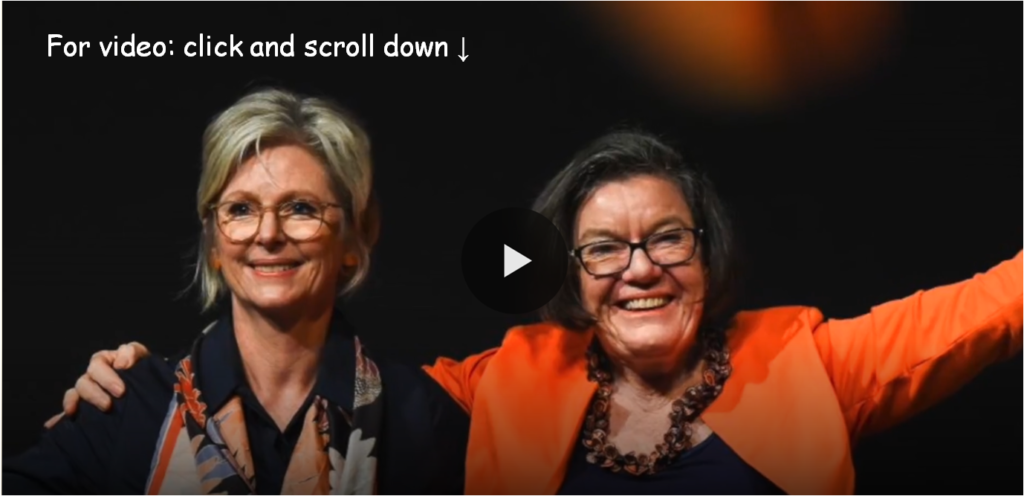Teal First Speeches in Parliament

A flock of teal independents has landed in Parliament. Their ‘first speeches’ show why their community independent movement is so important.
Introduction
This article here is an extract from a major essay I am currently writing on the origins, emergence and evolution of the ‘teal tsunami’ and the growth of the body of knowledge enabling and generated by the revolution. A preliminary version of the essay will be published in parts on Climate Sentinel News as they are finished. Discussion and commentary on them will be greatly appreciated as this will help me improve the final product to be formally published.
For several years I have been hopelessly pessimistic about the capacity of our governments to solve the existential problems the human species faces as we slide down the road to runaway global warming leading to an unsurvivable Hothouse Earth. However, after attending the Community Independents Project Convention, ‘Empowered Communities – Next Steps‘ and listening to these ladies describe their life histories and intentions going into Parliament, I am optimistic that they will help transform our government into a capable instrument for organizing appropriate responses to the dangers ahead.
The image featured in this post is from a blog by someone else who attended the CIP Convention and draws the same very optimistic conclusions I have. Begin with the video linked from the blog to share some of the excitement this transformation in bringing:

It isn’t a (political) party. It’s a celebration and affirmation of a revolutionary new kind of politics
By Millie Rooney, (undated) in Australia Remade
Celebrating doing democracy differently
I’ve spent the whole weekend attending an online work-related convention and I should be feeling resentful about being trapped inside at my computer. But the crazy thing is, I’m more excited to be at my desk on a Monday morning than I have been for weeks!
I was at Empowered Communities: Next Steps, the Community Independents Convention and I’m still buzzing.
The event was an opportunity for “community campaigners, ‘voices for’ and community groups, peak bodies, community independent MPs, candidates seeking what next and all those interested in community engagement and grassroots democracy” to share their experiences and ideas, to celebrate what has been achieved and to think about the next steps.
And GOSH it was interesting! There was a full range of fascinating sessions from those in Parliament, to those who’d only just engaged in capital-P politics for the first time, to those who’ve been playing with campaign ideas for years.
I’ve tried to distill some of what I think were the most interesting lessons to come out of the convention, but first, I want to talk about the vibe…
Read the complete article….
As will be demonstrated in subsequent parts of this project, evidence from the Parliamentary performances of early teal MPs and their precursors is that once elected, they continue working for what their electorates tell them they want. Because they don’t forget or ignore their electors, they seem to keep getting reelected for as long as they want to stay in the job.
Political parties representing special interests take note:
I would argue that the election of a flock of teal independents to our parliamentary lower house represents a fundamental revolution in the nature of the Australian political system (the Senate will be discussed elsewhere). The transformation is from ‘representative’ democracy mainly representing special interests, to one of ‘participatory’ democracy, where communities of voters genuinely select and guide work of their preferred representatives. The ladies embodying this transformation come from a variety of backgrounds ranging from affluent urban electorates to comparatively hard scrabble rural communities. A common factor is that most of these transformed electorates were considered to be Liberal Party heartlands. Let the teals tell you in their own words in their ‘First Speeches’ on entry to Parliament why they ran and what they are intending to do.
As you listen to these speeches, you might consider what this tells you about the Liberal Party they are demolishing…. The Labor Party is likely to be next — especially if they don’t begin to rapidly progress actions to stop and reverse global warming.
Every one of these teal independents’ speeches is worth listening to in its entirety (20-30 min each). These women as truly remarkable: Each is caring, motivated, intelligent, wise, capable and responsible — and practiced in networking, listening, negotiating and managing. Together, they represent a fundamentally transformative revolution in Australian politics.
However, to gain a flavor without spending a whole day, each of the First Speech links below starts with a point in each speech focusing on something that tells an important story about the teal tsunami or the new MP. Dot points below jump to other significant topics in each speech.
PRECURSORS
Rob Oakeshott, elected 2008
First speech not found
Valedictory 27/06/2013 28m (link includes transcript)
TEAL INDEPENDENTS (lower house only)
i.e., community independents who have specifically prioritized climate action in their Parliamentary agendas
Kathy McGowan
INDI, elected 2013, returned 2016, succeeded by teal Helen Haines in 2019
2/12/2013
Rebekha Sharkie
MAYO, elected 2016, reelected 2018, returned 2019, and returned again in 2022
19/09/2016
Kerryn Phelps
WENTWORTH, elected 20/10/2018, succeeded by Dave Sharma 2019
26/11/2018
Helen Haines,
INDI, elected 2019, returned 2022
01/08/2019
Zali Steggall
WARRINGA, elected 2019, returned 2022
24/07/2019
Allegra Spender
WENTWORTH, elected 2022, replacing Dave Sharma
02/08/2022
Monique Ryan
KOOYONG, elected 2022
28/07/2022
Zoe Daniel
GOLDSTEIN, elected 2022
01/08/2022
Sophie Scamps
MACKELLAR, elected 2022
01/08/2022
Kylea Tink
NORTH SYDNEY, elected 2022
28/07/2022
Kate Chaney
CURTIN, elected 2022
28/07/2022
In one sense, all of these speeches are mundane statements of what each of these new MPs is bringing to Parliament, i.e., they should be totally boring like the shopping lists they are. But listened to in detail, they are definitely not boring to anyone like me, concerned with the future of our planet, society, and communities. These people are extraordinary, in heritage, in experience, in community involvement, and in prior achievements. There is every reason to think they will do even more in the future than they have up to this point. To hear such people talking about how they will help shape our futures is optimistically exciting…..
I can even hope that Australia’s transformation in politics will spread to other ‘democratic’ nations around the world where control is held by political parties representing special interests rather than their communities of voters such that we can work collectively to address the only issue that really matters — climate change.